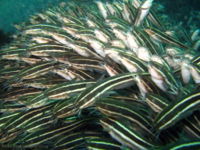Striped Catfish (Plotosus lineatus)
From The Aquarium Wiki
Striped Catfish
Plotosus lineatus
757 Litres (200 US G.)
25.4-30.5cm (10-12 ")
8.0 - 8.5
22.2-23.9°C (72 -75 °F)
8-12 °d
2:3 M:F
5-7 years
Family
Plotosidae
Contents
Additional names
- Striped Catfish, Striped Eel Catfish, Stinging Catfish, Coral Catfish, Marine Catfish
Additional scientific names
- Platystacus anguillaris, Plotoseus ikapor, Plotosus anguillaris, Plotosus arab, Plotosus castaneoides, Plotosus castaneus, Plotosus flavolineatus, Plotosus marginatus, Plotosus thunbergianus, Plotosus vittatus, Silurus arab, Silurus lineatus
Sexing
- It is very difficult to visually sex this fish.
Tank compatibility
- These fish must be kept in groups, if kept singly they will become shy and stop eating. They lose their shoaling behaviour as they mature. Can be kept with other fish, preferably larger yet peaceful species.
Diet
- Should accept most foods including marine flake and live/frozen foods like mysis shrimp.
Feeding regime
- Feed once or twice a day.
Environment specifics
- These fish need a set up of a sand/gravel or coral/rock rubble with a good current is preferred with plenty hiding places in the aquarium.
Behaviour
- When young this fish forms very large tight balls for protection, often with over 100 individuals. As it matures it becomes more solitary with around 20 individuals in one area, hiding in reef crevices and caves and hunting for food.
Identification
- This fish has bold white and black horizontal stripes as a juvenile, these become more muted as the fish matures. It has a long elongated eel-like body with extended soft dorsal and anal fins which stretch from the middle section of the body to the tail.
- This fish also has 4 sets of barbels and has a highly venomous spine on the first dorsal fin and each of the pectorals, and therefore needs very careful handling with at least two people present at all times. This poison can even prove fatal.
Pictures
External links
- Fishbase (Mirrors:
 )
)

